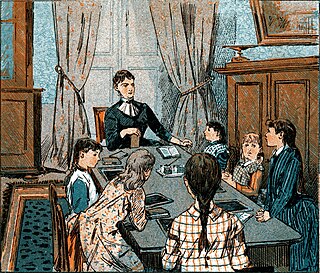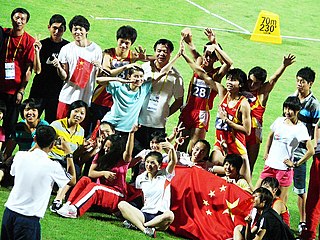
Action sports, adventure sports or extreme sports are activities perceived as involving a high degree of risk. These activities often involve speed, height, a high level of physical exertion and highly specialized gear. Extreme tourism overlaps with extreme sport. The two share the same main attraction, "adrenaline rush" caused by an element of risk, and differ mostly in the degree of engagement and professionalism.

Homeschooling or home schooling, also known as home education or elective home education (EHE), is the education of school-aged children at home or a variety of places other than a school. Usually conducted by a parent, tutor, or online teacher, many homeschool families use less formal, more personalized and individualized methods of learning that are not always found in schools. The actual practice of homeschooling varies considerably. The spectrum ranges from highly structured forms based on traditional school lessons to more open, free forms such as unschooling, which is a lesson- and curriculum-free implementation of homeschooling. Some families who initially attended a school go through a deschool phase to break away from school habits and prepare for homeschooling. While "homeschooling" is the term commonly used in North America, "home education" is primarily used in Europe and many Commonwealth countries. Homeschooling should not be confused with distance education, which generally refers to the arrangement where the student is educated by and conforms to the requirements of an online school, rather than being educated independently and unrestrictedly by their parents or by themselves.
Self-esteem is confidence in one's own worth, abilities, or morals. Self-esteem encompasses beliefs about oneself as well as emotional states, such as triumph, despair, pride, and shame. Smith and Mackie define it by saying "The self-concept is what we think about the self; self-esteem, is the positive or negative evaluations of the self, as in how we feel about it ."

Physical education, often abbreviated to Phys. Ed. or PE, and sometimes informally referred to as gym class or simply just gym, is a subject taught in schools around the world. PE is taught during primary and secondary education and encourages psychomotor, cognitive, and effective learning through physical activity and movement exploration to promote health and physical fitness. When taught correctly and in a positive manner, children and teens can receive a storm of health benefits. These include reduced metabolic disease risk, improved cardiorespiratory fitness, and better mental health. In addition, PE classes can produce positive effects on students' behavior and academic performance. Research has shown that there is a positive correlation between brain development and exercising. Researchers in 2007 found a profound gain in English Arts standardized test scores among students who had 56 hours of physical education in a year, compared to those who had 28 hours of physical education a year.

An extracurricular activity (ECA) or extra academic activity (EAA) or cultural activities is an activity, performed by students, that falls outside the realm of the normal curriculum of school, college or university education. Such activities are generally voluntary (as opposed to mandatory), social, philanthropic, and often involve others of the same age. Students and staff direct these activities under faculty sponsorship, although student-led initiatives, such as independent newspapers, are very common. However, sometimes the school principals and teachers also bring in these activities in the school among the students.

Alfie Kohn is an American author and lecturer in the areas of education, parenting, and human behavior. He is a proponent of progressive education and has offered critiques of many traditional aspects of parenting, managing, and American society more generally, drawing in each case from social science research.

The Triple Gold Club is the group of ice hockey players and coaches who have won an Olympic Games gold medal, a World Championship gold medal, and the Stanley Cup, the championship trophy of the National Hockey League (NHL). The International Ice Hockey Federation (IIHF) considers them to be "the three most important championships available to the sport".

A helicopter parent is a term for a parent who is overattentive and overly fearful of a child's experiences and problems, particularly outside the home and at educational institutions. Helicopter parents are so named because, like helicopters, they "hover overhead", overseeing every aspect of their child's life. A helicopter parent is also known to strictly supervise their children in all aspects of their lives, including in social interactions.

A parenting style is a pattern of behaviors, attitudes, and approaches that a parent uses when interacting with and raising their child. The study of parenting styles is based on the idea that parents differ in their patterns of parenting and that these patterns can have a significant impact on their children's development and well-being. Parenting styles are distinct from specific parenting practices, since they represent broader patterns of practices and attitudes that create an emotional climate for the child. Parenting styles also encompass the ways in which parents respond to and make demands on their children.

Envy is an emotion which occurs when a person lacks another's quality, skill, achievement, or possession and wishes that the other lacked it.
A child beauty pageant is a controversial beauty contest featuring contestants under 16 years of age. Competition categories may include talent, interview, sportswear, casual wear, swimwear, western wear, theme wear, outfit of choice, decade wear, and evening wear. Depending on the type of pageant system, contestants may be found wearing anything from makeup to fake teeth, known as flippers, as well as elaborate hairstyles and custom-designed fitted outfits to present their routines on stage.
A narcissistic parent is a parent affected by narcissism or narcissistic personality disorder. Typically, narcissistic parents are exclusively and possessively close to their children and are threatened by their children's growing independence. This results in a pattern of narcissistic attachment, with the parent considering that the child exists solely to fulfill the parent's needs and wishes. A narcissistic parent will often try to control their children with threats and emotional abuse. Narcissistic parenting adversely affects the psychological development of children, affecting their reasoning and their emotional, ethical, and societal behaviors and attitudes. Personal boundaries are often disregarded with the goal of molding and manipulating the child to satisfy the parent's expectations.
American football was featured in the Summer Olympic Games demonstration programme in 1904 and 1932. College football was played at the 1904 Olympics, which was played at Francis Field, but was, in reality, college teams playing each other as part of their regular seasons. The sport was eventually played officially as a demonstration sport only once, in 1932. Though American football has not been played in the Olympics since then, various American football players have participated in the Olympics. The International Federation of American Football (IFAF) oversees the IFAF World Championship, which is an international tournament, which itself is held every four years.

True You: A Journey to Finding and Loving Yourself is a self-help book co-authored by American singer Janet Jackson and biographer David Ritz, released on February 15, 2011. In the book, Jackson opens up about her struggles with food, body image, and relationships. It topped The New York Times Best Seller list in the Hardcover Advice and Misc. section the week of March 6, 2011.
Tiger parenting is a form of strict parenting, whereby parents are highly invested in ensuring their children's success. Specifically, tiger parents push their children to attain high levels of academic achievement or success in high-status extracurricular activities such as music or sports. The term "tiger mother" was brought to public attention by Yale Law School professor Amy Chua in her 2011 memoir Battle Hymn of the Tiger Mother.

Youth sports is any sports event where competitors are younger than adult age, whether children or adolescents. Youth sports includes school sports at primary and secondary level, as well as sports played outside the education system, whether informally or organized.
Sexualization in child beauty pageants has been the topic of controversy and debate. Since all contestants for these pageants are minors, there are concerns regarding the potential long-term impacts early sexualization can have on their psyche. These impacts can negatively affect a contestant's self-esteem and relationship with their own bodies throughout their lives due to hyperfixation on achieving professional adult aesthetics at a young age. In more extreme cases, the impacts of early sexualization in pageants can lead to various psychological disorders such as depression, anxiety disorder, and various eating disorders. However, there is also support of children competing in beauty pageants due to the way contestants are challenged to have more confidence in order to be able to compete successfully in these pageants.
Sports are activities involving physical exertion and skill, in which a team compete against another as a form of entertainment. The universality of sport allows it to encompass several different rights. Most sporting events have a huge impact on human rights. Human rights are rights that are believed to belong to justifiably every person. In particular youth sport which concerns the rights of children. The practice of sport is beneficial to children as it can have a positive impact on their physical, mental, psycho-motor and social development skills. Sport is helpful in a human rights context as it encourages the integration of children from different cultural or economic backgrounds, those with disabilities and helps promote gender equality.
The participation of transgender people in competitive sports, a traditionally sex-segregated institution, is a controversial issue, particularly the inclusion of transgender women and girls in women's sports.

Modern Muslim female athletes have achieved success in a variety of sports, including volleyball, tennis, association football, fencing, and basketball. In the 2016 Summer Olympics, fourteen women from Muslim-majority countries won medals, participating in a wide range of sports.











